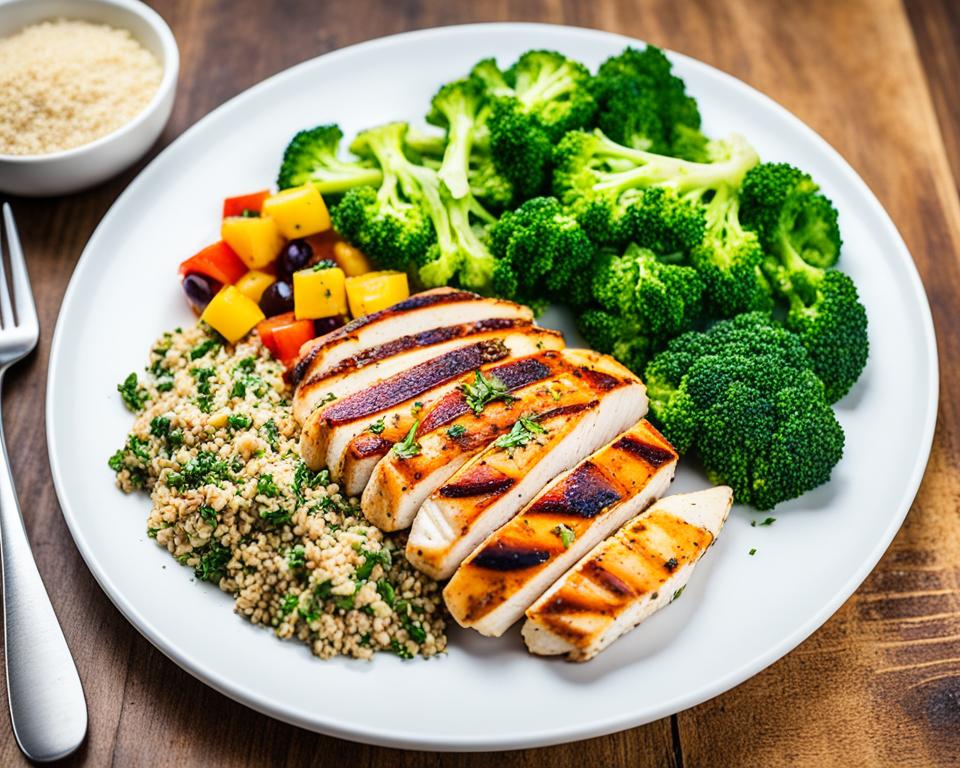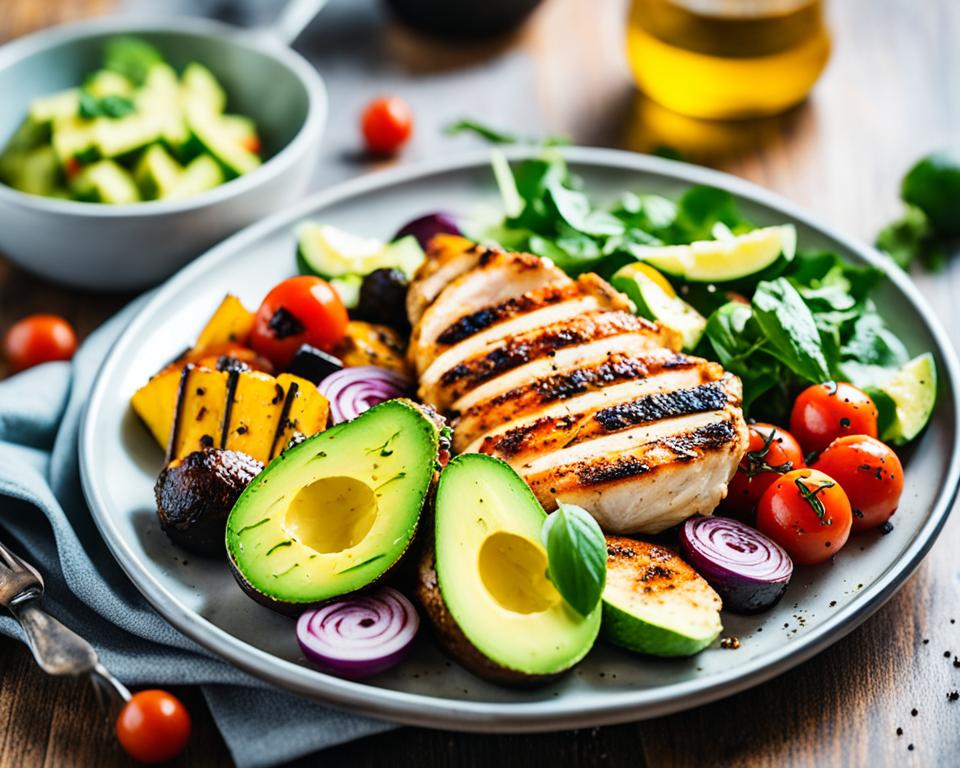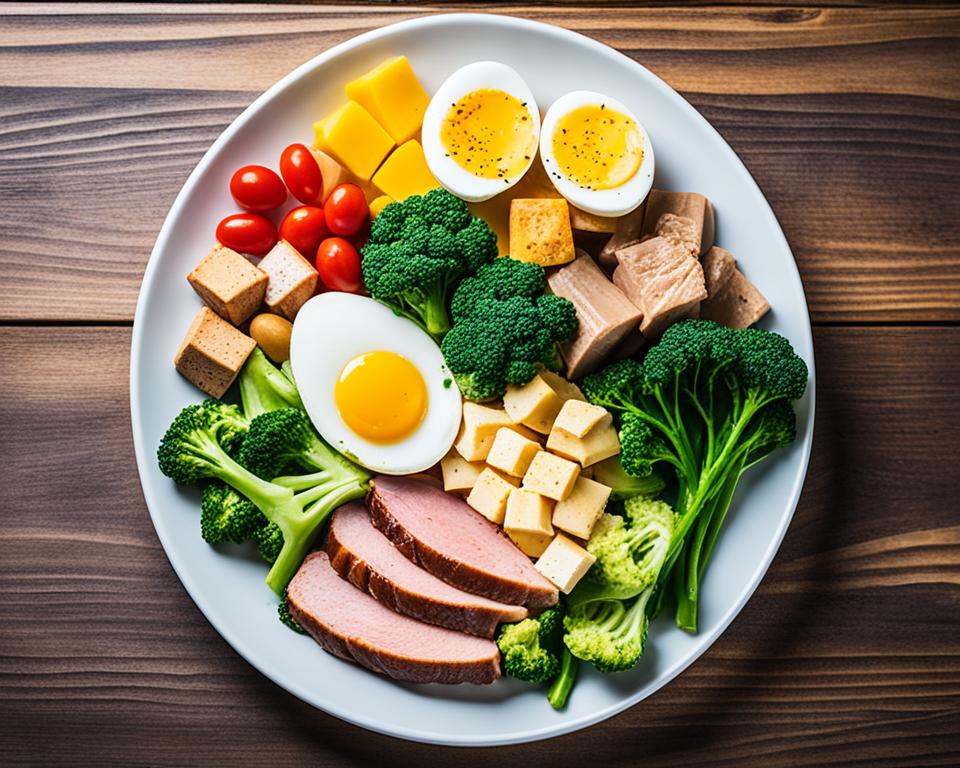Achieving and maintaining a healthy weight is a common goal for many individuals. If you’re looking for a way to manage your weight without sacrificing flavor, low-calorie keto meals may be the solution you’ve been searching for. Combining the principles of a ketogenic diet with calorie-consciousness, these meals offer a delicious and healthy approach to weight management.
The ketogenic diet is a popular eating plan that involves reducing carbohydrates and increasing fats and proteins. By doing so, the body enters a state of ketosis, where it burns fat for energy instead of glucose. This process can lead to weight loss and increased satiety, making it an effective strategy for managing weight.
While traditional ketogenic meals are often high in calories, low-calorie keto meals focus on finding the right balance of nutrients without compromising taste. By selecting ingredients that are both keto-friendly and low in calories, you can create meals that support weight management while still satisfying your palate.
Key Takeaways:
- Low-calorie keto meals combine the principles of a ketogenic diet with calorie-consciousness for effective weight management.
- The ketogenic diet involves reducing carbohydrates and increasing fats and proteins to encourage the body to burn fat for energy.
- Low-calorie keto meals focus on finding a balance of keto-friendly ingredients that are also low in calories.
- These meals can help promote weight loss and increase satiety.
- By following a low-calorie keto meal plan, you can achieve your weight management goals without sacrificing flavor.
Understanding the Ketogenic Diet
The ketogenic diet is a popular low carb and high fat diet that has gained attention for its potential benefits in weight loss and improved overall health. By limiting carbohydrates and increasing the consumption of healthy fats, the body enters a state called ketosis, where it starts using fat for energy instead of glucose. This metabolic shift can lead to significant weight loss and increased satiety.
The ketogenic diet typically consists of a low percentage of calories from carbs, a high percentage from fat, and a moderate percentage from protein. It is commonly followed with a macronutrient distribution of 5-10% carbohydrates, 70-75% fat, and 15-20% protein. Research has shown that this type of diet can effectively support weight management and improve various health markers.
The Science Behind Ketosis
When the body is deprived of carbohydrates, which are its primary source of energy, it starts breaking down fat reserves to produce ketones. Ketones are byproducts of fat metabolism and are used by the body as an alternative fuel source. This state of ketosis can accelerate weight loss by increasing fat burning and reducing insulin levels.
Additionally, the ketogenic diet promotes a feeling of increased satiety due to the high fat and protein content of meals. This can help control hunger and reduce food cravings, leading to a decreased calorie intake and further supporting weight loss efforts.
The ketogenic diet has gained popularity for its ability to induce a state of ketosis, where fat is used as the body’s primary source of fuel. This can result in significant weight loss and improved satiety.
Benefits of the Ketogenic Diet for Weight Management
Studies have shown that the ketogenic diet offers a range of benefits for weight management:
- Promotes rapid weight loss by targeting stored fat as the primary energy source.
- Reduces appetite and cravings, making it easier to adhere to a calorie-restricted diet.
- Increases satiety levels, reducing the desire for snacking and unnecessary calorie consumption.
- Improves metabolic health markers, such as insulin sensitivity and blood lipid profiles.
- Preserves lean muscle mass while promoting fat loss.
Incorporating a ketogenic diet into a weight loss plan can provide individuals with a sustainable and effective way to reach their desired weight goals.
Ketogenic Diet and Weight Loss Research
Scientific studies have demonstrated the efficacy of the ketogenic diet in promoting weight loss. For example, a systematic review published in the American Journal of Clinical Nutrition analyzed several randomized controlled trials and concluded that low-carbohydrate ketogenic diets lead to greater weight loss compared to low-fat diets over a six-month period.
Another study, published in the Journal of Clinical Endocrinology and Metabolism, found that individuals on a ketogenic diet lost significantly more weight and reduced their body fat percentage compared to those on a low-fat diet.
These findings highlight the effectiveness of the ketogenic diet in promoting weight loss and its potential as a long-term approach to weight management.
| Benefit | Description |
|---|---|
| Accelerated weight loss | The ketogenic diet promotes the use of stored fat as the primary energy source, leading to rapid weight loss. |
| Reduced appetite | The high fat and protein content of ketogenic meals can help control hunger and reduce cravings. |
| Increased satiety | A ketogenic diet can keep you feeling fuller for longer, reducing the desire for snacking and unnecessary calorie consumption. |
| Improved metabolic health | The ketogenic diet can improve insulin sensitivity and blood lipid profiles, contributing to overall metabolic health. |
| Preservation of lean muscle | Unlike some other diets, the ketogenic diet preserves lean muscle mass while promoting fat loss. |
Basics of the Ketogenic Diet
The ketogenic diet, commonly known as the keto diet, is a low carb, high fat, and moderate protein diet that has gained popularity for its potential weight loss and health benefits. By significantly reducing carb intake and increasing fat consumption, the body enters a metabolic state called ketosis, where it starts using stored fat for energy instead of carbohydrates.
On a standard 2,000-calorie diet, the keto diet typically restricts carb intake to 20-50 grams per day, making it extremely low in carbs. The primary focus of the diet is to consume foods that are rich in healthy fats, such as eggs, poultry, fatty fish, meat, full-fat dairy, nuts and seeds, and oils. Avocados and non-starchy vegetables, like leafy greens, are also staples in a keto diet.
Here is a list of keto-friendly foods:
- Eggs
- Poultry
- Fatty fish
- Meat
- Full-fat dairy
- Nuts and seeds
- Oils rich in healthy fats
- Avocados
- Non-starchy vegetables
- Condiments
To achieve and maintain ketosis, certain foods should be limited or avoided altogether. These include bread, sweets, pasta, grains, starchy vegetables, beans, fruit, high-carb sauces, and certain alcoholic beverages. By eliminating or minimizing carb-rich foods, the body is forced to burn fat for fuel, resulting in weight loss and other potential health benefits.
“The keto diet is a low carb, high fat diet that can help individuals achieve ketosis, a state where the body uses fat for energy.”
Adhering to the principles of the ketogenic diet requires careful planning and mindful food choices. By following a low carb, high fat, and moderate protein approach, individuals can harness the power of ketosis to support their weight loss goals and overall health.
Ketogenic Diet Meal Plan
Switching to a ketogenic diet involves reducing carb intake while increasing fat and protein intake. It’s important to create a well-rounded keto meal plan that includes a variety of delicious and keto-friendly foods. By focusing on the right ingredients, you can enjoy flavorful meals while still achieving your weight management goals.
A keto meal plan should primarily consist of:
- Eggs: A versatile and nutrient-rich option for breakfast, lunch, or dinner.
- Poultry: Chicken and turkey are excellent sources of lean protein.
- Fatty Fish: Salmon, trout, and mackerel are high in omega-3 fatty acids.
- Meat: Opt for grass-fed beef, pork, or lamb for added nutrients.
- Full-Fat Dairy: Incorporate cheeses, butter, and cream for additional flavor.
- Nuts and Seeds: Almonds, walnuts, chia seeds, and flaxseeds provide healthy fats and fiber.
- Oils Rich in Healthy Fats: Olive oil, coconut oil, and avocado oil are excellent choices.
- Avocados: A great source of healthy fats and fiber, perfect for salads or as a snack.
- Non-Starchy Vegetables: Broccoli, spinach, cauliflower, and zucchini are low in carbs and high in nutrients.
- Condiments: Use herbs, spices, and low-carb sauces to enhance the flavor of your meals.
Maintaining ketosis requires monitoring your carb intake, aiming for 20-50 grams per day depending on your personal needs and activity level. By keeping your carb intake low and focusing on keto-friendly foods, you can stay on track and achieve the desired results.
Here is an example of a simple ketogenic meal plan:
| Day | Meal |
|---|---|
| Monday | Breakfast: Scrambled eggs with sautéed spinach. |
| Lunch: Grilled chicken Caesar salad with avocado. | |
| Dinner: Baked salmon with roasted asparagus. | |
| Tuesday | Breakfast: Keto-friendly smoothie with almond milk, spinach, and berries. |
| Lunch: Turkey lettuce wraps with avocado and bacon. | |
| Dinner: Cauliflower crust pizza with toppings of your choice. | |
| Wednesday | Breakfast: Chia seed pudding with unsweetened coconut flakes. |
| Lunch: Keto-friendly chicken and vegetable stir-fry. | |
| Dinner: Grilled steak with sautéed mushrooms and a side of steamed broccoli. | |
| Thursday | Breakfast: Avocado bacon and egg cups. |
| Lunch: Zucchini noodles with pesto and grilled shrimp. | |
| Dinner: Baked chicken thighs with roasted Brussels sprouts. | |
| Friday | Breakfast: Keto-friendly pancakes with sugar-free syrup. |
| Lunch: Spinach and feta-stuffed chicken breast with a side salad. | |
| Dinner: Grilled salmon with lemon butter sauce and garlic roasted green beans. |
Remember, this is just a sample meal plan, and you can customize it based on your preferences and dietary needs. Consult with a healthcare professional or nutritionist to create a personalized keto meal plan that aligns with your goals and supports your overall health.
Ketogenic Snack Options
Snacking between meals can be a helpful strategy for managing hunger while following a ketogenic diet. Fortunately, there are plenty of delicious and keto-friendly snack options available to keep you satisfied throughout the day. These snacks are low in carbs, high in healthy fats, and packed with flavor, making them the perfect choice for anyone following a low carb or keto lifestyle. Here are some fantastic keto snack options to add to your repertoire:
1. Almonds and Cheddar Cheese
Almonds and cheddar cheese make for a satisfying and portable snack. The combination of crunchy almonds and creamy cheese provides a perfect balance of protein and healthy fats.
2. Avocado Stuffed with Chicken Salad
For a filling and keto-friendly snack, halve an avocado and fill the cavity with chicken salad. The creamy avocado and protein-rich chicken make for a tasty and nutritious treat.
3. Guacamole with Low Carb Veggies
Indulge in some guacamole accompanied by a selection of low carb veggies such as cucumber slices, bell pepper strips, or celery sticks. This refreshing and satisfying snack is packed with healthy fats and fiber, keeping you satisfied and nourished.
4. Nuts and Seeds
A handful of nuts and seeds is an excellent option for a quick and convenient keto snack. Choose from almonds, walnuts, pumpkin seeds, or sunflower seeds for a nutritious and satisfying treat.
5. Hard-Boiled Eggs
Hard-boiled eggs are a keto staple and an excellent source of protein and healthy fats. They are easy to prepare in advance and make for a convenient and portable snack.
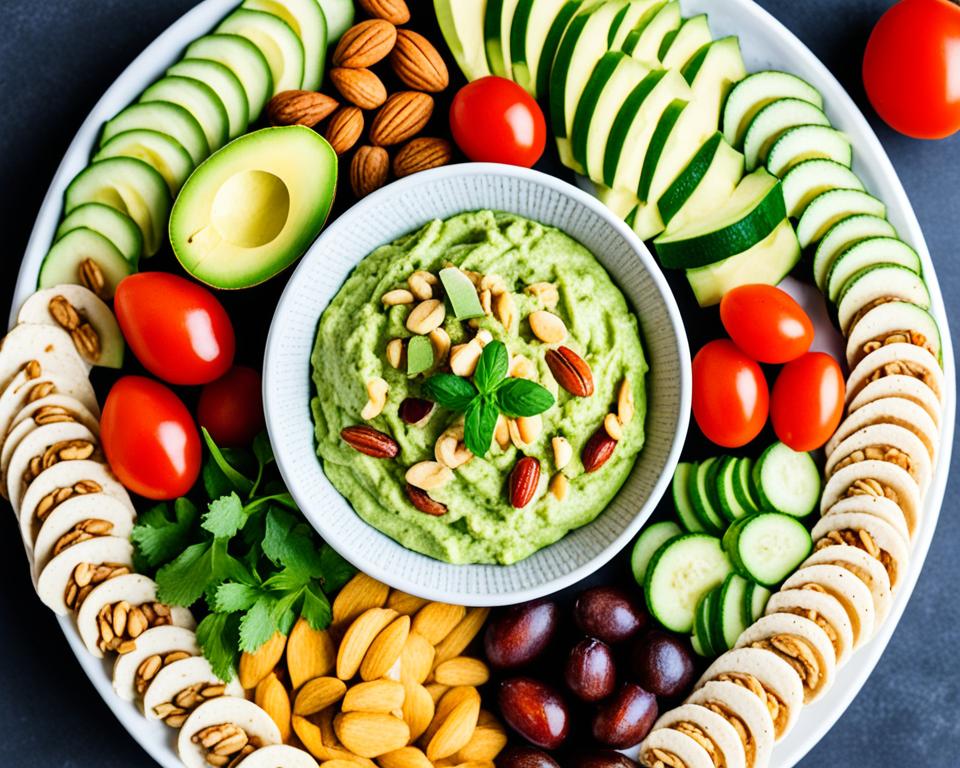
6. Coconut Chips and Kale Chips
For a satisfying and crispy snack, try coconut chips and kale chips. These low carb alternatives to traditional chips provide a crunchy texture and are packed with flavor.
7. Olives and Sliced Salami
Olives and sliced salami make for a savory and indulgent snack combination. The salty olives and rich salami are a perfect pairing for keto-friendly snacking.
8. Celery and Peppers with Herbed Cream Cheese Dip
Enjoy the crunch of celery and peppers with a delicious and creamy herbed cream cheese dip. This refreshing and flavorful snack is low in carbs and perfect for dipping.
9. Berries with Heavy Whipping Cream
If you’re craving something sweet, a bowl of fresh berries topped with a dollop of heavy whipping cream is a keto-friendly option. The natural sweetness of the berries combined with the rich cream make for a delightful treat.
10. Jerky
Jerky is a convenient and protein-packed snack that is perfect for keto diets. Look for jerky made from high-quality meats with minimal additives and added sugars.
11. Cheese Roll-Ups
For a quick and easy snack, roll up slices of your favorite cheese with deli meats such as turkey or ham. These cheese roll-ups are rich in protein and satisfyingly delicious.
12. Parmesan Crisps
Indulge your cravings for something crunchy with homemade Parmesan crisps. These crispy cheese chips are simple to make and provide a satisfying alternative to traditional snacks.
13. Macadamia Nuts
Macadamia nuts are a keto-friendly nut option that is high in healthy fats and low in carbs. They make for a tasty and satisfying snack either on their own or paired with other nuts.
14. Greens with High Fat Dressing and Avocado
Enjoy a nutritious and flavor-packed snack by combining your favorite leafy greens with a high fat dressing and avocado slices. This combination provides a satisfying boost of healthy fats and fiber.
15. Keto Smoothies
For a refreshing and satisfying snack, whip up a keto smoothie using ingredients such as avocado, spinach, coconut milk, and a low-carb sweetener. This creamy and delicious snack option is packed with nutrients and will keep you energized.
16. Avocado Cocoa Mousse
Satisfy your sweet tooth with a guilt-free avocado cocoa mousse. Made with avocado, unsweetened cocoa powder, and a low-carb sweetener, this rich and creamy dessert is a perfect keto-friendly treat.
These keto snack options provide a variety of flavors and textures to indulge in while maintaining a low carb lifestyle. Whether you’re looking for something savory, sweet, or crunchy, there is a snack option to suit your preferences. Incorporate these delicious and keto-friendly snacks into your daily routine to keep hunger at bay and stay on track with your ketogenic diet.
A Simple Ketogenic Shopping List
A well-rounded ketogenic diet consists of fresh produce, healthy fats, and proteins. When preparing your keto shopping list, be sure to include the following keto-friendly ingredients:
Eggs: A versatile and nutrient-dense ingredient that can be used in various keto recipes.
Poultry: Chicken and turkey are lean sources of protein that can be enjoyed on a keto diet.
Fatty Fish: Salmon, mackerel, and sardines are excellent sources of omega-3 fatty acids, which provide numerous health benefits.
Meat: Opt for grass-fed beef, pork, and lamb, which are high in healthy fats and essential nutrients.
Full-Fat Dairy: Include items like cheese, butter, and full-fat yogurt in your shopping list for added flavor and richness.
Nuts and Seeds: Almonds, walnuts, chia seeds, and flaxseeds are healthy, low-carb snack options that are packed with essential nutrients.
Oils Rich in Healthy Fats: Coconut oil, olive oil, and avocado oil are excellent choices for cooking and adding healthy fats to your meals.
Avocados: A staple on the keto diet, avocados are rich in healthy fats and can be used in various recipes or enjoyed as a snack.
Non-Starchy Vegetables: Leafy greens, broccoli, cauliflower, zucchini, and bell peppers are nutrient-dense and low in carbs, making them perfect for a ketogenic diet.
Condiments: Include keto-friendly condiments like mayonnaise, mustard, and hot sauce to enhance the flavor of your meals without adding unnecessary carbs.
Low Glycemic Fruits: While fruits should be consumed in limited amounts on a keto diet, you can still enjoy low glycemic options such as berries and small portions of citrus fruits.
For a well-balanced keto shopping list, it is recommended to choose a mixture of both fresh and frozen produce. This ensures that you have a variety of options available while also maintaining their nutritional value.
To visually guide you in creating your ketogenic shopping list, take a look at the table below:
| Category | Examples |
|---|---|
| Protein | Eggs, Poultry, Fatty Fish, Meat |
| Healthy Fats | Full-Fat Dairy, Nuts and Seeds, Oils Rich in Healthy Fats, Avocados |
| Produce | Non-Starchy Vegetables, Low Glycemic Fruits |
| Condiments | Mayonnaise, Mustard, Hot Sauce |
Benefits of Low-Calorie Keto Meals
Low-calorie keto meals offer numerous benefits for weight management. These meals can help you stay in a state of ketosis, where your body uses fat for energy, leading to weight loss. Additionally, low-calorie keto meals can increase satiety due to the combination of healthy fats and proteins, helping you feel fuller for longer periods.
When you consume low-calorie keto meals, your body enters ketosis, a metabolic state where it relies on fat as its primary source of fuel. By reducing carb intake and increasing fat consumption, you encourage your body to burn stored fat, resulting in weight loss. This can be especially beneficial for individuals looking to manage their weight effectively.
“Low-calorie keto meals can be a powerful tool for weight management. They provide the body with the necessary nutrients while keeping calorie intake low, making it easier to create a calorie deficit and lose weight. This approach can be particularly effective when combined with regular exercise.”
In addition to weight loss, these meals promote satiety, which means you feel satisfied and full after eating. This is due to the combination of healthy fats and proteins commonly found in low-calorie keto meals. Healthy fats, such as those from avocados, nuts, and oils, can help slow down digestion and keep you feeling fuller for longer periods. Proteins, found in foods like lean meats, poultry, and fish, also help to increase satiety and prevent overeating.
By incorporating low-calorie keto meals into your diet, you can experience the benefits of weight management and increased satiety, helping you achieve your health and wellness goals while still enjoying delicious and nutritious meals.
| Benefits of Low-Calorie Keto Meals | Explanation |
|---|---|
| Promotes weight loss | Low-calorie keto meals help your body enter ketosis, leading to increased fat burning and weight loss. |
| Increases satiety | The combination of healthy fats and proteins in low-calorie keto meals helps you feel fuller for longer, reducing cravings and excessive eating. |
| Provides essential nutrients | Low-calorie keto meals are packed with important nutrients, ensuring your body receives the necessary vitamins and minerals for optimal health. |
| Sustainable approach | Following a low-calorie keto meal plan can be a sustainable approach to weight management, as it allows for a wide variety of tasty and satisfying meals. |
| Supports overall well-being | Consuming low-calorie keto meals can contribute to improved energy levels, better focus, and improved overall well-being. |
Keto Breakfast:
Start your day with a nutritious and delicious low-calorie keto breakfast:
- Egg Muffins with Spinach and Cheese
- Avocado and Bacon Omelette
Keto Lunch:
Enjoy a satisfying and low-calorie keto lunch:
- Grilled Chicken Salad with Avocado
- Cauliflower Fried Rice with Shrimp
Keto Dinner:
End your day with a flavorful and low-calorie keto dinner:
- Baked Salmon with Asparagus
- Lemon Herb Pork Chops with Roasted Brussels Sprouts
This sample low-calorie keto menu showcases a variety of meal options to inspire your keto journey. The recipes incorporate ingredients such as eggs, chicken, pork, vegetables, and seafood, providing a balance of nutrients while keeping the carb count low. Remember, you can always adjust the menu based on your individual dietary needs and preferences.
Delicious Low-Calorie Keto Recipes
Looking for flavorful and healthy keto meals that won’t derail your weight management goals? Look no further! We’ve curated a collection of delicious low-calorie keto recipes that are sure to satisfy your taste buds while keeping you on track. Whether it’s breakfast, lunch, dinner, or snacks, these recipes are packed with essential nutrients and are perfect for those following a low-calorie keto diet.
Breakfast
- Egg and Spinach Muffins: These portable muffins are loaded with protein and greens, making them a filling and nutritious breakfast option.
- Avocado and Bacon Omelette: Start your day with a creamy avocado and crispy bacon omelette that is both satisfying and keto-friendly.
- Low-Carb Blueberry Pancakes: Indulge in fluffy blueberry pancakes made with almond flour and topped with a dollop of whipped cream.
Lunch
- Grilled Chicken Caesar Salad: Enjoy a classic Caesar salad with grilled chicken breast for a satisfying and low-calorie keto lunch.
- Salmon and Avocado Salad: This refreshing salad combines nutrient-rich salmon, creamy avocado, and leafy greens for a light and flavorful meal.
- Cauliflower Fried Rice: Replace traditional rice with cauliflower rice in this delicious and low-carb version of fried rice.
Dinner
- Lemon Garlic Butter Chicken: Tender chicken breasts cooked in a tangy lemon garlic butter sauce will become a family favorite in no time.
- Salmon with Roasted Vegetables: Oven-roasted salmon paired with a colorful array of roasted vegetables makes for a nutritious and satisfying dinner.
- Cauliflower Crust Pizza: Satisfy your pizza cravings with a low-carb cauliflower crust topped with your favorite keto-friendly toppings.
Snacks
- Keto Cheese Chips: Crunchy and cheesy, these homemade cheese chips are perfect for snacking on the go.
- Baked Buffalo Cauliflower Bites: Spice up your snacking game with these flavorful and low-calorie buffalo cauliflower bites.
- Avocado Egg Salad Wraps: Whip up a batch of this creamy avocado and egg salad for a satisfying and portable snack.
With these delicious low-calorie keto recipes, you can enjoy a variety of flavorful meals while staying on track with your weight management goals. Incorporate these recipes into your meal planning and savor the benefits of a healthy keto lifestyle.
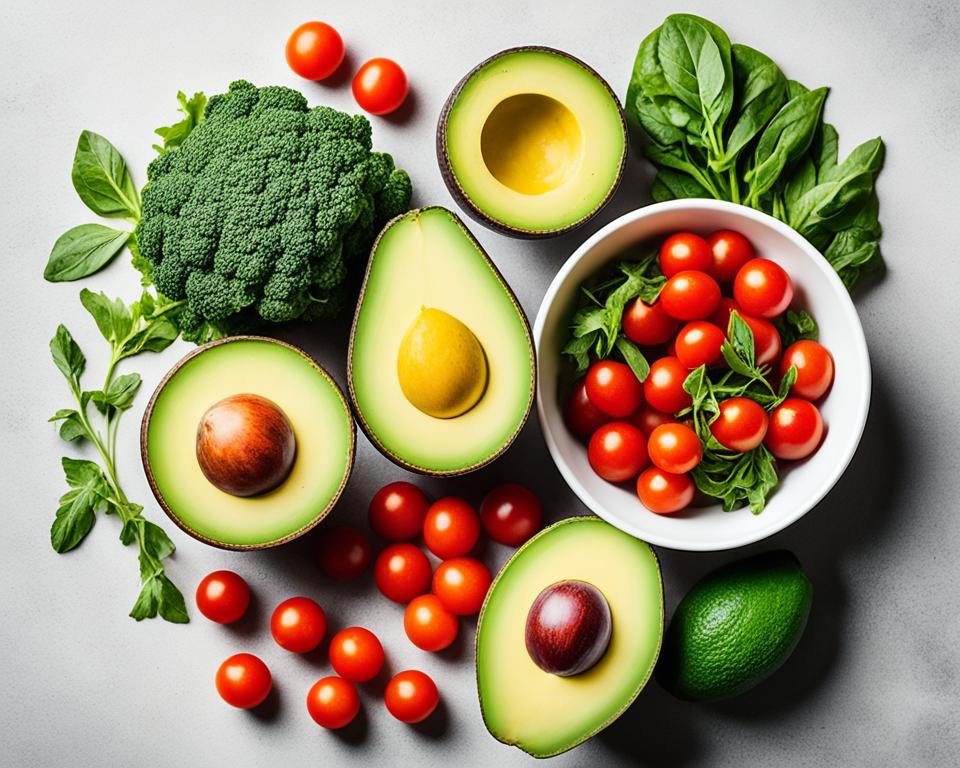
Keto-Friendly Dessert Options
Even on a low-calorie keto diet, satisfying your sweet tooth is possible with delicious dessert options that are low in carbs and high in fats. These keto-friendly desserts not only provide a guilt-free indulgence but also help you stay on track with your weight management goals.
Coconut Avocado Pops
These refreshing popsicles combine the creaminess of avocado with the tropical flavor of coconut. They are a perfect treat for hot summer days. To prepare these popsicles, simply blend ripe avocados, coconut milk, a low-carb sweetener like stevia or erythritol, and a splash of lime juice. Pour the mixture into popsicle molds and freeze until solid. Enjoy the creamy and decadent goodness without the guilt!
Almond-Crusted Creole Salmon
This unique and flavorful dessert option takes a savory twist with almond-crusted creole salmon. Season salmon fillets with a blend of creole spices and coat them with a mixture of finely ground almonds and grated Parmesan cheese. Bake the salmon until golden and crispy. The combination of the nutty almond crust and the tender salmon makes for a delightful dessert that is both low in carbs and high in healthy fats.
Cream Mint Brownie Bars
If you’re a fan of mint and chocolate, these cream mint brownie bars are a must-try. Prepare a rich and fudgy keto-friendly brownie base using almond flour, unsweetened cocoa powder, eggs, butter, and a low-carb sweetener. For the mint cream layer, mix cream cheese, heavy cream, mint extract, and another low-carb sweetener. Layer the mint cream over the brownie base and refrigerate until set. Cut into bars and savor the decadent combination of chocolate and refreshing mint.
Peanut Butter Chocolate Chip Skillet Cookie
Indulge in the delightful combination of peanut butter and chocolate with this keto-friendly skillet cookie. In a mixing bowl, combine peanut butter, almond flour, baking powder, butter, a low-carb sweetener, and sugar-free chocolate chips. Spread the dough evenly in a cast-iron skillet and bake until golden and crispy on the edges. Allow the skillet cookie to cool slightly before slicing and enjoying the warm, gooey goodness.
These keto-friendly dessert options prove that you can still satisfy your sweet tooth while following a low-calorie keto diet. By using ingredients that are low in carbs and high in healthy fats, you can enjoy delicious treats without derailing your weight management goals. So go ahead and indulge in these guilt-free keto sweet treats!
Tips for Success on a Low-Calorie Keto Diet
Successfully following a low-calorie keto diet requires careful planning and attention to key factors. These tips will help you stay on track with your weight management goals and make the most of your keto journey.
1. Plan and Prepare Meals in Advance
Planning and preparing your meals in advance is crucial for maintaining a low-calorie keto diet. By having keto-friendly meals readily available, you can avoid making impulsive food choices that may derail your progress. Consider batch cooking and meal prepping on weekends to ensure you have delicious and satisfying meals ready throughout the week.
2. Track Your Carb Intake
Monitoring your carb intake is essential on a low-calorie keto diet. Keep a record of the carbohydrates you consume each day to ensure you stay within the recommended range for ketosis. This will help you maintain a state of fat-burning and achieve your weight management goals.
3. Stay Hydrated
Staying hydrated is important for overall health and can support your weight management efforts on a low-calorie keto diet. Aim to drink at least 8 cups of water per day to stay properly hydrated. You can also include herbal teas and infused water for added flavor and variety.
4. Include a Variety of Keto-Friendly Foods
To keep your low-calorie keto diet interesting and nutritionally balanced, it’s important to include a variety of keto-friendly foods. This includes incorporating different sources of healthy fats, proteins, and low-carb vegetables into your meals. Experimenting with new ingredients and recipes will help prevent food boredom and ensure you’re getting a wide range of nutrients.
5. Listen to Your Body’s Hunger Signals
Listen to your body’s hunger signals and eat when you’re truly hungry. This will help you maintain a healthy relationship with food and prevent overeating. Pay attention to how different foods make you feel and adjust your intake accordingly. Being mindful of your hunger and satiety cues is an important aspect of successful weight management on a low-calorie keto diet.
6. Consult with a Nutritionist
Consulting with a nutritionist or registered dietitian who specializes in ketogenic diets can provide you with personalized guidance and support. They can help ensure you’re getting the proper nutrients and calories for your individual goals and health history. A professional can also offer advice on optimizing your low-calorie keto diet for weight management and overall health.
Essential Keto Diet Tips
| Tips | Description |
|---|---|
| Plan and Prepare Meals in Advance | By planning and preparing your meals in advance, you can avoid impulsive food choices and stay on track with your low-calorie keto diet. |
| Track Your Carb Intake | Monitoring your carb intake is crucial for maintaining ketosis and achieving your weight management goals. |
| Stay Hydrated | Proper hydration is important for overall health and can support your weight management efforts on a low-calorie keto diet. |
| Include a Variety of Keto-Friendly Foods | Incorporating a variety of keto-friendly foods will keep your diet interesting and ensure you’re getting a wide range of nutrients. |
| Listen to Your Body’s Hunger Signals | Being mindful of your body’s hunger and satiety cues will help you maintain a healthy relationship with food and prevent overeating. |
| Consult with a Nutritionist | Seeking guidance from a nutritionist can provide personalized support and ensure you’re meeting your nutritional needs on a low-calorie keto diet. |
Implementing these tips into your low-calorie keto diet will set you up for success and help you achieve your weight management goals. Remember, everyone’s journey is unique, so be patient and listen to your body as you navigate the world of low-calorie keto eating.
Conclusion
Discover the benefits of incorporating low-calorie keto meals into your weight management journey and embrace a healthy keto lifestyle. By following a low-calorie keto meal plan, you can enjoy delicious and flavorful foods while still working towards your weight management goals.
Low-calorie keto meals offer a winning combination of healthy fats and proteins, which can help increase satiety, keeping you feeling fuller for longer. This is essential for controlling cravings and maintaining a balanced and sustainable approach to weight management.
Remember to consult with a healthcare professional or nutritionist before embarking on any new diet or weight loss plan to ensure it is suitable for your individual needs and goals. With the right guidance and a commitment to smart food choices, you can achieve the results you desire and maintain a healthy keto lifestyle for the long term.
FAQ
What is a ketogenic diet?
A ketogenic diet is a high fat and low carb diet that can help with weight loss. It focuses on reducing carbs and increasing fats and proteins.
How does the ketogenic diet work for weight management?
The ketogenic diet puts your body into a state of ketosis, where it uses fat for energy instead of glucose. This can lead to weight loss and increased satiety.
What foods should be included in a ketogenic diet?
A ketogenic diet should include foods such as eggs, poultry, fatty fish, meat, full-fat dairy, nuts and seeds, oils rich in healthy fats, avocados, non-starchy vegetables, and condiments.
What foods should be limited on a ketogenic diet?
Foods to limit on a ketogenic diet include bread, sweets, pasta, grains, starchy vegetables, beans, fruit, high carb sauces, and certain alcoholic beverages.
What are some keto-friendly snack options?
Keto-friendly snack options include almonds and cheddar cheese, avocado stuffed with chicken salad, guacamole with low carb veggies, nuts and seeds, hard-boiled eggs, coconut chips, kale chips, olives and sliced salami, celery and peppers with herbed cream cheese dip, berries with heavy whipping cream, jerky, cheese roll-ups, Parmesan crisps, macadamia nuts, greens with high-fat dressing and avocado, keto smoothies, and avocado cocoa mousse.
What should be included in a ketogenic shopping list?
A ketogenic shopping list should include ingredients such as eggs, poultry, fatty fish, meat, full-fat dairy, nuts and seeds, oils rich in healthy fats, avocados, non-starchy vegetables, condiments, and low glycemic fruits in limited amounts. Choosing a mixture of both fresh and frozen produce is recommended.
What are the benefits of low-calorie keto meals?
Low-calorie keto meals can help with weight management, as they can keep your body in a state of ketosis and increase feelings of satiety due to the combination of healthy fats and proteins.
Can I have a sample low-calorie keto menu?
Yes, a sample low-calorie keto menu can provide ideas and inspiration for those following a keto diet. It includes a variety of breakfast, lunch, and dinner recipes with ingredients such as eggs, chicken, pork, vegetables, and seafood.
Are there delicious low-calorie keto recipes available?
Yes, there are a variety of delicious low-calorie keto recipes available that can support weight management. These recipes include options for breakfast, lunch, dinner, and snacks, with ingredients such as chicken, salmon, cauliflower, eggs, cheese, and avocados.
Can I have keto-friendly desserts on a low-calorie keto diet?
Absolutely! Keto-friendly dessert options include coconut avocado pops, almond-crusted creole salmon, cream mint brownie bars, and peanut butter chocolate chip skillet cookie. These desserts are low in carbs, high in fats, and can satisfy your sweet tooth without derailing your weight management goals.
What tips can help me succeed on a low-calorie keto diet for weight management?
To succeed on a low-calorie keto diet, it’s important to plan and prepare meals in advance, track your carb intake, stay hydrated, include a variety of keto-friendly foods in your diet, and listen to your body’s hunger signals. It’s also beneficial to consult with a nutritionist to ensure you’re getting the proper nutrients and calories for your personal goals and health history.
Can low-calorie keto meals support weight management?
Yes, low-calorie keto meals can be a great option for weight management while still enjoying delicious and flavorful foods. By following a low-calorie keto meal plan, incorporating keto-friendly ingredients, and making smart food choices, you can achieve your weight management goals and maintain a healthy keto lifestyle.
Is it recommended to consult with a professional before starting a low-calorie keto diet?
Yes, it is always recommended to consult with a healthcare professional or nutritionist before starting any new diet or weight loss plan to ensure it is suitable for your individual needs and goals.

